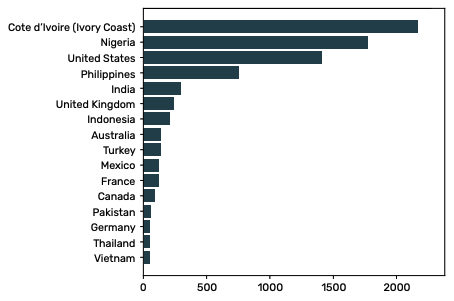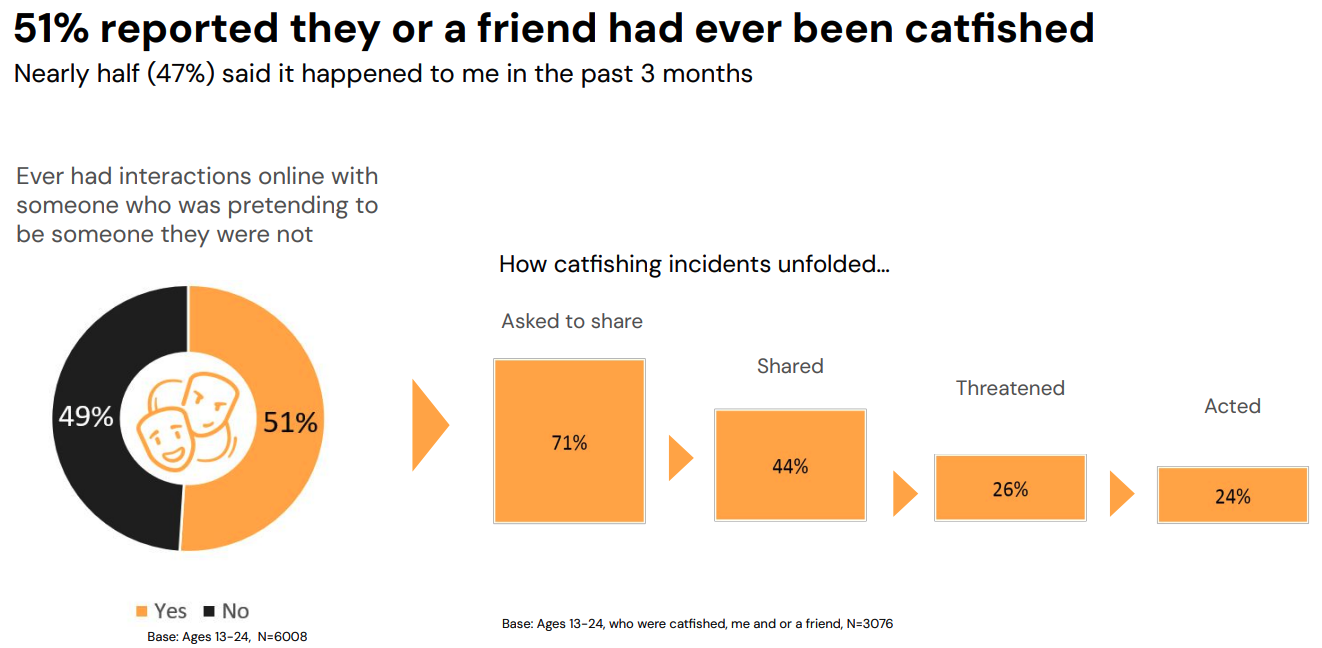
Sextortion Reports Linked to a Country, https://info.thorn.org/hubfs/Research/Thorn_TrendsInFinancialSextortion_June2024.pdf
In recent years, criminals running sextortion scams have largely targeted boys and leveraged the internet to engage in financial sextortion at scale. In the first half of 2023, almost all the sextortion reports dealt with by the Internet Watch Foundation (IWF) involved boys. The IWF is now warning that younger children, as well as increasing numbers of girls, are being exposed to sexual extortion (sextortion). IWF data released in Aug 2024, show that:
- Overall – in the first six months of 2024, child sexual abuse reports related to sexual extortion are up 19% compared to the same period in 2023.
- Victims are getting younger – with a 25% increase in reports involving 14-15 year olds compared to the previous year. In 2024, for the first time, there were three confirmed reports involving children aged 11-13 years.
- While boys still make up the majority of victims, there has been a 2,600% increase in reports involving girls compared to the same period last year.
In June 2024, Thorn, in partnership with the National Center for Missing and Exploited Children (NCMEC), examined more than 15 million reports made to the CyberTipline from 2020 to 2023 to pinpoint cases of sextortion and examine the evolving scale and nature of financially motivated sextortion. The report’s key findings:
- Sextortion, and particularly financial sextortion, continues to be a major and ongoing threat, with an average of 812 reports of sextortion per week to NCMEC in the last year of data analyzed, and with reason to expect that the vast majority of those reports are financial sextortion.
- Perpetrators leverage tactics to intentionally fan a victim’s worry about the life-changing impacts of their nudes being shared—often repeating claims that it will “ruin their life.”
- Instagram and Snapchat are the most common platforms used for sextortion with trends regarding the emergence of additional end-to-end encrypted messaging apps to move victims to secondary platforms and the prevalence of Cash App and gift cards for methods of payment.
- The two countries from which sextortion perpetrators are often operating, Nigeria and Cote d’Ivoire, make use of slightly different tactics and platforms.
- Reports submitted by Instagram constitute a clear majority of all reports of apparent sextortion submitted to NCMEC. However, there are reasons to worry whether other platforms are underreporting.
The Thorn/NCMEC report provides resources and information on sextortion and for those:
- Experiencing sextortion or worried about their imagery.
- Worried about their imagery being shared.
In March-April 2024, Snap Inc polled 1,037 U.S.-based teens and young adults, asking about their exposure to and knowledge of various online sexual crimes against minors. Participants responded, referencing their experiences on a range of online platforms and services, not just Snapchat. Some initial key findings include:
- Sexual-related online risks are endemic for many teens and young adults, with more than two-thirds (68%) reporting that they had shared intimate imagery online or experienced grooming or catfishing behaviors.
- Fake personas are pervasive online and are a major driver of digital risk exposure. Among those who shared intimate imagery, or experienced grooming or catfishing behaviors, nine in 10 (90%) said the other person lied about their identity.
- Sharing intimate imagery and catfishing are high-risk gateways to online sextortion, as nearly half of those who shared intimate imagery were threatened with sextortion. Males were more susceptible to being sextorted than females (51% vs. 42%), and financial sextortion – demanding money, gift cards, or something else of value from the target – was more common among males (34% vs. 9%). In such scenarios, females were more often asked for additional sexual imagery (57% vs. 37%).
- Unfortunately, although probably not surprisingly, a noteworthy percentage of teens and young adults (41%) who experienced one of these three risks kept it to themselves. Just 37% reported grooming to the online platform, law enforcement, and / or a hotline. Intimate imagery was the only risk where a healthy – but still insufficient – percentage of those targeted (63%) reported the problem; more than half (56%) said they reported financial sextortion that occurred via catfishing.
In 2023, a Snap Inc ongoing study found that 65% of Gen Z teens and young adults, on all platforms and devices – not just Snapchat — said they or their friends were targeted in online catfishing (criminals pretend to be someone they are not to lure a victim into sharing personal information or producing sexual imagery) scams, or were hacked by criminals who stole explicit personal imagery or other private information. In both scenarios, the resulting photos and videos were then used to threaten or blackmail the young people, with abusers demanding money, gift cards, more sexual imagery, or other personal information in supposed exchange for not releasing the material to the young person’s family and friends.

Snap Inc Digital Well Being Index, https://assets.ctfassets.net/kw9k15zxztrs/5YeLYk9Rzh2RTOGuGa37aq/09fcac523225cdfd955ab0e06f386ba7/Snap-__2023_Digital_Well-Being_Index_Wave_2_Report.pdf
- Half (51%) of respondents said they or their friends were targeted for, or victims of, catfishing, and 47% of those cases targeted respondents directly over the prior three months.
- Meanwhile, 47% of respondents said they or their friends’ devices or social media accounts were hacked, with 39% of those instances happening to respondents in the last quarter.
The above research demonstrates that we are literally at war with cybercriminals targeting our sons and daughters at scale. There is a wealth of information in the above studies parents can use to reduce negative outcomes and the shame of victimization. Since perpetrators use countdowns and rapid, repeated messaging to reduce the likelihood for victims to get help, parents can ensure their children are empowered with the knowledge that deliberate attempts may be made to isolate them. Parents need to maintain a dialogue with their children to ensure they know how to keep themselves safe with online technology and when and where to ask for help and support if they need it.




